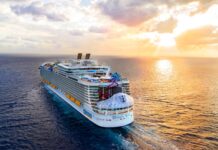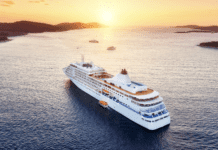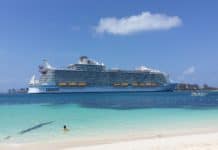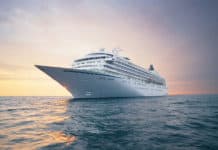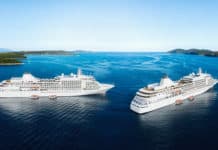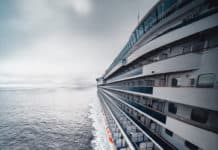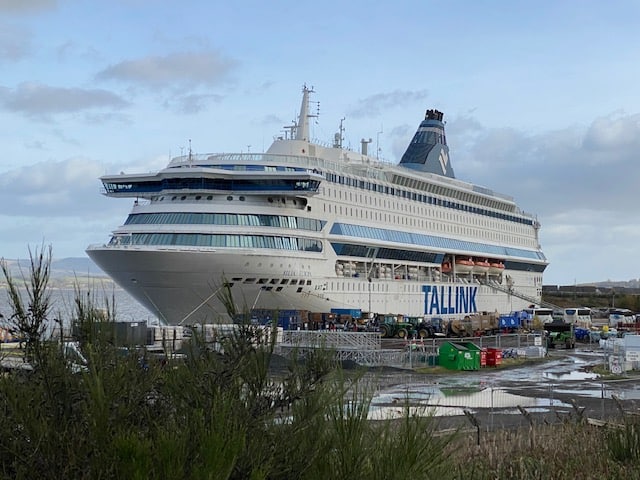
Cruise ships were on deck to house COP26 security, AV and other critical staff members.
What do you do when a citywide event takes over all available hotel rooms, leaving no accommodations for the event organizer’s critical workforce members? If you’re providing security, production, audiovisual, build and technical services to the 26th United Nations Climate Change Conference of the Parties (COP26), which just wrapped up a packed agenda that ran from Oct. 31-Nov. 12 in Glasgow, Scotland, you call in some cruise ships.
And that, in fact, is what happened. Landry & Kling Global Cruise Services, leaders in sourcing and logistics for vessel charters, floating accommodations and cruise events worldwide, was called upon to broker the use of two cruise ferry ships that normally operate in the Baltic Sea to serve as floating hotels for COP26 support personnel for the conference’s duration. The ships, operated by Estonia-based Tallink Grupp, were the Silja Europa and Tallink Romantika, which together provided almost 2,000 sleeping cabins and catering services to support the organizers’ workforce. Landry & Kling provided logistics for the vessel charter project, including coordination with the port, ships’ staff and UK Port Health.
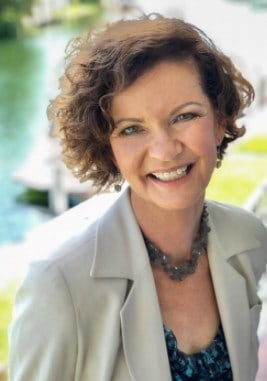
This wasn’t Landry & Kling’s first rodeo by a long shot — the company has been providing logistics for auxiliary housing on cruise ships since 1987, when it brought two ships to the World Trade Center in Boston to accommodate attendees for a 60,000-person technology conference. Since then, the company has handled a number of similar projects for clients including the Olympics and government events. In fact, just earlier this year Landry & Kling facilitated the use of the cruise ferry Silja Europa to house 1,000 police officers during the June 2021 G7 Summit in Cornwall, England.
But the COP26 project was a little different, says Landry & Kling CEO Joyce Landry.
Quick Turnaround Time
For example, the timing was a bit tighter than usual. While talks between the company and the U.K. Foreign Office began earlier in the summer, organizers weren’t yet sure how many ships they may end up needing. The first was chartered about 60 days in advance of the conference’s start; the second less than two weeks out. While the first ship, which was coming fully crewed from Estonia, wasn’t a problem, the second was more of a push. “This was the shortest notice we’ve had in the history of our company,” says Landry. “It required the line to divert the second ship, which was on its way from Morocco to Estonia, to Glasgow, and provision the crew in Glasgow. We had to be flexible and work hard to make it happen since it was so last-minute.”
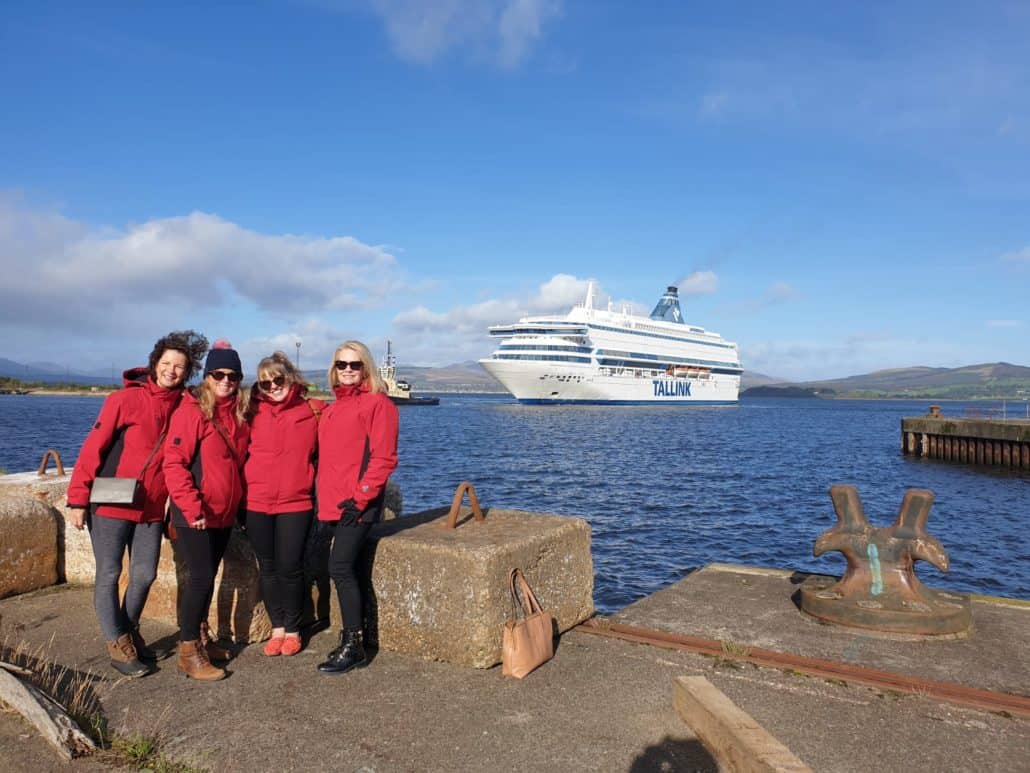
To make it all happen on schedule, Landry & Kling pulled in staff from Miami and hired more in the UK to handle the logistics, and hired another company, SMS, to handle the cruise ship registration — which was no small project. “We had more than 1,000 people who needed to register and check in on the same day, and SMS was great.” Landry also was glad for her recent experience with the cruise operator going into the COP26 project: “We already had worked with Tallink on the G7, so we knew what to expect, and they knew what to expect.”
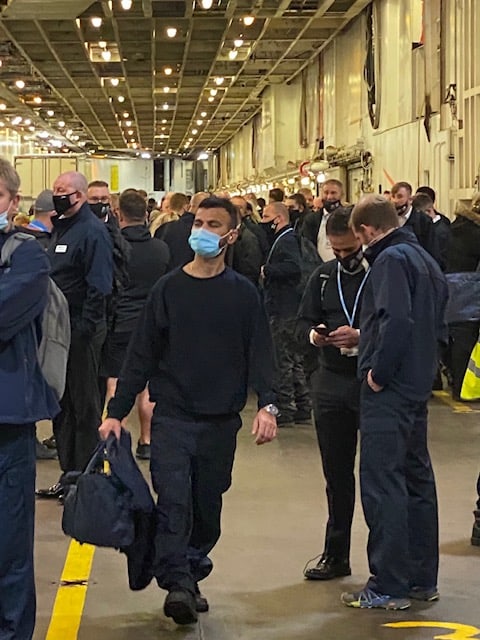
Cruise Ship Catering with a Halal Twist
When Landry & Kling worked with the G7 Summit, the main catering questions revolved around ensuring they had the right blends of tea. For the COP26 project, they were told to expect about 15% to 20% of the guests might have special dietary requirements that likely would be satisfied with a combination of fish and vegetarian options. When they got on board, they found out that close to 80% would require halal meals. While it was a bit of a scramble to find halal provisioning locally in Scotland, they worked with Tallink and the port agent to find what they needed within 48 hours and the chef was able to take it from there.
24/7 Security
Ironically, one of the challenges in housing the security details for the conference was providing security for the security staff. “We had to secure the ship 24 hours a day because they were working two 12-hour shifts and we had people wandering around while others were sleeping at all times. The company that was providing the security teams for conference put together a separate team just for the vessels. “They had people in uniforms patrolling the hallways and elevators to make sure that everyone was comfortable, to ensure the noise level was kept low, and to short-circuit any potential security issues on board,” Landry said.
On Ship and Off
The ships were docked at two separate ports, neither of which was walking distance to the conference site. “Together with the charterers, we coordinated a system of minivan and bus services, including a bus service that ran every half hour to a large shopping center in case anyone needed to buy something,” she says. Because everyone on each shift had to eat and be off the ship at the same time, there were hundreds of guests who needed to be fed, show their negative COVID test results and get down the gangway and onto the bus in time to make their shift. And all this was happening as those coming off-shift were looking to reboard, have their meal and head off to bed. This created a bit of a bottleneck at first — especially when some of the buses were delayed when security had to stay until midnight to work a dignitary dinner one night early on — but after a few days it was running like clockwork, Landry said.
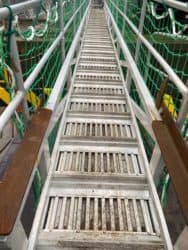
Scotland being Scotland, the weather also could be a challenge in unpredictability, Landry says. “The weather could, and did, turn on a dime.” To mitigate a muddy gangway issue on one of the ships, Landry’s team worked with the port to build a carpeted platform that would provide traction on the rain-slick entrances and egresses.
COVID Cruise Ship Considerations
Scottish government rules and regulations required guests and crew to wear masks everywhere while on board, except when eating and drinking, she says. Everyone also was tested daily, with the results uploaded to the National Health System. Anyone who exhibited any COVID-like symptoms had to take a PCR test immediately. If it was positive, that person would be whisked off the ship and accommodated in isolation until they were cleared to go back to work.
On Board with Sustainability
Not surprisingly for a climate change conference, “Everything had to be on a highly sustainable level,” says Landry. Even before the ships reached the area the ships had to document policies and procedures for how they would handle waste and recycling on board, among many other criteria.
While neither of the ships is a new build, both are designed to meet the very high sustainability requirements they need to cruise in the Baltic and are built to operate cleanly, including using a higher quality of fuel. In fact, the ships run so clean that they were powered using their own idling engines rather than local shore power. Other sustainability policies included providing reusable water bottles and mugs guests were encouraged to refill at the ships’ 24-hour filtered water and coffee/tea stations.
“Bringing in accommodation ships is an ideal, cost-effective solution that solved the critical workforce housing needs of COP26,” said Landry. “Both Silja Europa and Tallink Romantika provided safe and secure accommodations that were warm and dry, with little to no impact on the environment.”
You Might Also Be Interested In
Net Zero Carbon Events: A Call to Action
New Digital Event Carbon Calculator



